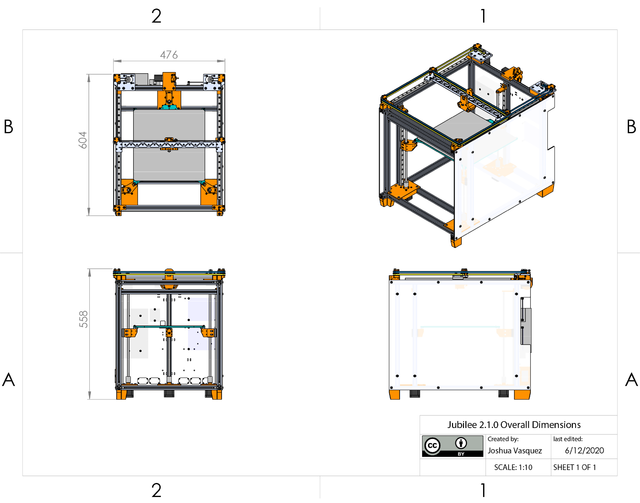Difference between revisions of "Specs"
Jump to navigation
Jump to search
Poofjunior (talk | contribs) |
Poofjunior (talk | contribs) |
||
| Line 34: | Line 34: | ||
== How it Works == | == How it Works == | ||
| − | Read more about Jubilee's subsystem design in the links below: | + | Read more about Jubilee's subsystem design and intended software behaviors in the links below: |
| + | |||
| + | ===Hardware Design=== | ||
* [[Locating_Tools]] | * [[Locating_Tools]] | ||
* [[The_Remote_Elastic_Lock]] | * [[The_Remote_Elastic_Lock]] | ||
* [[A Kinematically Coupled Bed]] | * [[A Kinematically Coupled Bed]] | ||
| + | |||
| + | ===Softare Behaviors=== | ||
| + | * [[Changing Tools]] | ||
== Pricing == | == Pricing == | ||
Revision as of 20:12, 4 July 2020
The following specs apply to the latest 2.1.x version of Jubilee. For a play-by-play view of changes across versions, see the Changelog.
Mechanical Motion System Design
- 300x300x300mm build space (with the default extruder). See the Build Volume Tool Relationship page for how tools change the effective build volume.
- All purchased parts called out in the V2 Shopping List.
- Designed such that the Z-axis can be adjusted to your liking with no changes to the XY frame or toolchanging setup.
- Core-XY layout for high-speed printing. Rapids of between 20000mm/min and 30000 mm/min depending on XY stepper motors and heatsinking options.
- Flush-Form CoreXY Belt Pattern. Upper and lower belts are laid out directly on top of each other, and belts only travel perpendicular to the frame. Belt-tensioning is done conveniently with two set-screws that adjust the motor locations along slots.
- Designed with Exact-Constraint machine-design principles where possible
- Kinematically coupled bed plate
- autotramming with 3-point bed-leveling (courtesy of the Duet)
- *Fabricatable.* Almost all fabricated parts are 3D printable. Printed parts are intentionally kept simple and minimize the use of support material. (Exceptions: the bed plate, crossbar, and toolchanger lock must be machined. See notes in the BOM for getting these parts made for cheap.)
- Metric fasteners everywhere.
- Documented with a comprehensive BOM and set of assembly instructions.
Tools and Tool-Changing
- 409mm of horizontal tool rack space, capable of holding 4 default extruder tools
- Detailed Space Specifications for adding custom tools presented in the Tool Interface Diagram (PDF).
- Automatic Toolchanging System compatible with both homebrew and E3D tool plates
- Sensored, torque-based locking system will lock down tool plates with a constant locking torque.
3D Printing
- Stellar print quality with direct-drive extruders. Jubilee can compete with systems at the $5K price range.
- Multicolor Printing possible *without* the need for a prime tower made possible by firmware-driven purge and wipe commands between tool changes. (This feature requires quite a bit of tuning to get working.)
- Slicer-agnostic. All the complexity of juggling tools is handled at the GCode firmware script level. Slicers need only change to a new tool by invoking a *T0*, *T1*, etc. command.
Extensibility
- User Extensible! Jubilee can accommodate custom tools and custom bed plates for specialized 3D-printing and uses beyond 3D printing. (See the Extending section)
Testing
- Cycle-tested. Jubilee has performed thousands of toolchanges flawlessly.
How it Works
Read more about Jubilee's subsystem design and intended software behaviors in the links below:
Hardware Design
Softare Behaviors
Pricing
- Self-Sourcing parts for Jubilee cost ~$1400 (US). The default extruder costs ~$200 each. We encourage community development for a wider spread of tools at different price points.
Legal
- Completely Open-Source with a CC-BY license. STLs, STEPs, and original Solidworks assemblies are included in the online project repository. Make use of the Jubilee design in ways that suit you.
